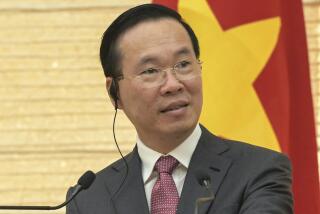The Trickle-Down Dictators
- Share via
In the summer of 1971, I met with a group of senior South Vietnamese military officers to discuss replacing their commander-in-chief, President Nguyen Van Thieu. The officers wanted an alternative to Thieu, who by then had alienated many in Washington as well as Saigon.
The Vietnamese commanders were (correctly) afraid that the United States would not support Thieu over the long period they thought would be required to win the war and rebuild South Vietnam. They also feared (again, correctly) that Thieu would continue to promote only those loyal to him, leaving the military commanded by incompetent sycophants.
By this point in the war, Thieu had:
--Arranged for the assassination of top rivals and the intimidation of many others.
--Rigged the scheduled presidential election to the point where even pro-government opposition candidates withdrew.
--Amassed a fortune in gold from opium trading and payola. Sound familiar?
While Thieu was probably not involved in drug trade to the extent of Panama’s Gen. Manuel A. Noriega, he was as corrupt and as difficult to remove. The meeting with the South Vietnamese officers helped me to understand why.
In South Vietnam, as in Panama today, political power came out of the barrel of a gun. The military controlled the guns and Thieu had astutely taken control of the army and police forces. He was the first South Vietnamese leader (after seven failures) to have done so since the assassination of Ngo Dinh Diem in 1963.
Thieu, like Noriega, had learned what his predecessors had not: Control of the military depended on loyalty, and loyalty could be bought, but it also had to be maintained. This required devising a system that not only made Thieu rich but also provided benefits that flowed from the top down.
Most dictators forget this and seek only to amass their own fortune. This makes them easier to overthrow. Often, such dictators are removed by “brother officers” because there is no real loyalty to the person at the top. As I learned from the South Vietnamese officers, Thieu had created a system that gave every loyal officer a stake in his continued hold on power. While each had to pay a bribe for remaining in office or command, Thieu allowed each, in turn, to exact a bribe from his own subordinate officers. Eventually, Thieu got half of what was collected. But the rest could be kept by those who collected it. In this way, I was told, everyone benefited.
Consequently, no matter where those interested in a change looked for support, there were Thieu loyalists and spies poised to thwart any attempt at change. And despite the fact that the U.S. government had succeeded in bugging the offices of Thieu and his closest advisers--and, therefore, knew of most of their plans to silence any opposition--neither American military power, economic sanctions, nor covert action succeeded in replacing Thieu with an honest and capable South Vietnamese leader. When South Vietnam fell to the North Vietnamese army in April of 1975, it was Thieu who gave the ill-fated order for the generals and colonels to abandon the retreating army.
Gen. Noriega is proving equally tenacious. He is a smart dictator who apparently knows how to buy and maintain loyalty. And thanks to lucrative drug deals, he has the funds to do so. So he is not likely to be removed from power easily, quickly, or as a result of U.S. policy--no matter how measured or aggressive.
The lesson is that clever dictators are hard to dump. The time to distance American interests from them is not when they violate human rights and nullify elections but from the very beginning.
More to Read
Sign up for Essential California
The most important California stories and recommendations in your inbox every morning.
You may occasionally receive promotional content from the Los Angeles Times.










